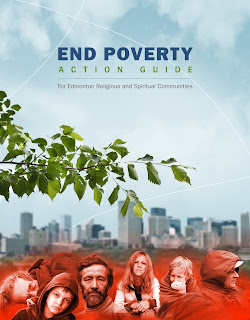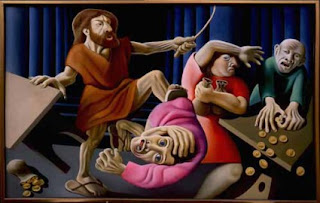End Poverty: It will take effort and self awareness
 On Wednesday I went to the End Poverty meeting at the Mustard Seed. Since I minister to the impoverished, homeless and addicted, I felt it necessary to be more informed about the city's strategy and the barriers that may inhibit success of this plan.
On Wednesday I went to the End Poverty meeting at the Mustard Seed. Since I minister to the impoverished, homeless and addicted, I felt it necessary to be more informed about the city's strategy and the barriers that may inhibit success of this plan.First, there are some staggering facts that people in Edmonton and the rest Canada are going to have to face. One is that poverty is on the rise. One out of eight people in Edmonton live in poverty (that is below the poverty line)! There is less affordable housing options available with property values increasing 11 percent in one year! This market, obviously, is bringing in investors into poorer neighbourhoods to build new housing with the intent of making the highest profit possible.
The cost of living is going up rapidly, wages stay stagnant, and new people are starting to enter the poverty world that I work in. The demographic is changing and End Poverty Edmonton is doing its part to get secure funding for new affordable housing, encourage churches and the greater community to be more involved with the End Poverty initiative. Is the goal lofty, sure. I see it this way, however, you never know how high you can jump if you keep the bar set closest to the ground. So if you are going to raise the bar, go for the highest setting point first, who knows you might make it.
I digress. The biggest struggle I see in the mandate is getting outer communities to welcome the poor into their area; to embrace affordable housing in their community; and to truly be hospitable to "our people." Of course this is a scary undertaking, but why? Some are worried about drugs, that these people are unclean and a whole cocktail of excuses that has perpetuated the NIMBY culture.
I believe behind all the noise of excuses is a fear that by committing to our undesirable neighbours (aka as the hard to house) we are committing ourselves to a long term relationship that may even take years to cultivate. A fear that you might actually have more in common with the "them" we fear. A fear that maybe, just maybe, that our neighbours who are in need might be only a mirror of how truly broken our homes and society really are, and that we need to work on our own defects before casting stones.
One of my favourite saints is Francis of Assisi and he actually despised lepers because they were ugly and poor. Francis would purposely avoid them. But by his misfortune, he ended up meeting them, living with them, building a relationship with them, and he had a conversion experience about his own ugliness in his spirit. What Francis realised is that his own judgemental behaviour was a way to avoid his own spiritual cancer--it was easier to lash out rather than work on himself.
He understood that it is not a "us" versus "them" situation concerning the fragility of our humanness, just that some hide it better due to having riches and wealth or in his case, despising the poor.
What Francis discovered is that all of us are broken, and that there is no them. The so called them were more "whole", more together, and insightful than he was. By embracing and even kissing the leper, he discovered that he was in need of repair, but the only way to do that was by rebuilding the whole community, not just some who are privileged. And maybe that is what we fear the most concerning ending poverty: that our impoverished people can teach us more about ourselves, than we can by helping them.



Comments
Post a Comment